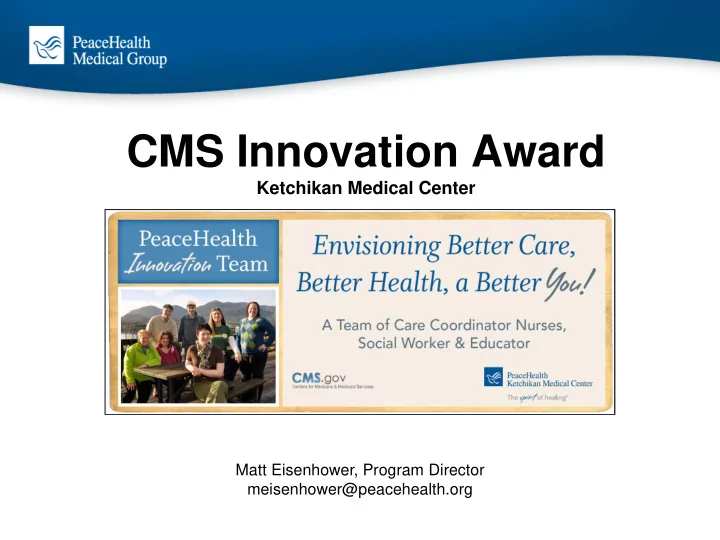

CMS Innovation Award Ketchikan Medical Center Matt Eisenhower, Program Director meisenhower@peacehealth.org
Results Overview 15-22% reduction in payments (depending on analysis) 27% reduction in 30 day “all - cause” readmissions Improvement in select clinical outcome areas
Reduction in Payments Method #1: Per Beneficiary Per Encounter , “Per Capita Cost reduction” Equation: Total CMS payments Total encounters Payer FY12 FY13 FY14 PROJECTED Change- Baseline FY12 CMS $536/encounter $457/encounter $418/encounter -22% Method #2: Historical Total Dollars FY14 PROJECTED Change- Baseline FY12 Payer FY12 FY13 CMS 11,020,737 10,422,101 $9,404,306 -15% Note: Encounters every year have increased.
Reduction in Payments- Looking at Hospital vs. Clinic Costs Payer Clinic PBPE Hospital PBPE 2012 2013 2014 2012 2013 2014 CMS $134 $130 $118 $1,187 $921 $832
30 Day “All Cause” Readmissions 18.00% Non-PHMG 16.00% PHMG 14.00% Poly. (Non-PHMG) 12.00% Poly. (PHMG) 10.00% 8.00% 6.00% 4.00% 2.00% 0.00% July August September October November December January February March Rate .98% 12.9% 7.79% 10% 12.28% 3.33% 15.78% 7.27% 7.14% 8.08% Numerator 1 8 6 8 7 2 9 4 4 49 Denominator 102 62 77 80 57 60 57 55 56 606 Rate 3.5% 5.1% 11% 8% 5.6% 9% 7.9% 0% 3% 5.88% Numerator 1 2 3 2 2 3 3 17 0 1 Denominator 29 39 27 25 36 35 38 27 33 289
Improvement in Health Maintenance (Some examples) Hemoglobin A1c Poor Control Emergency Room Clinic 17% Referrals A1c>9 16% 20 15% 15 14% 10 13% 12% 5 11% 0 10% Baseline Jan-13 Feb March April May June July Aug Sep Oct Nov Dec Jan-14 Feb Mar Apr May Jun Discharged Patient Follow-Up 100% 80% Hypertension patients on active 60% management plan has risen from 40% Successful follow-up 84% to 89% 20% Attempted 0%
Staff/Operations • 3 Primary Care Care-Coordinators (1 LPN and 2 RNs) • 1 .5 FTE Pediatrics • 1 Social Worker • 1 RN Educator- Medical Office Assts.
Primary interventions 1. Transition of Care ‘Next steps’ to care (appointments, tests/studies, acquiring medications) Medication reconciliation and teaching Psycho-social hurdles 2. Primary Care Provider Referrals 3. Diabetes Outreach/Upcoming appointments 4. Health Maintenance 5. Community Outreach/ Collaboration/ Catalyst
Program Participants (Since Inception) • 4828 Total Encounters Total Patient Encouters 600 500 400 300 Encounters 200 100 Poly. (Encounters) 0 • 2500 Unique Patients (July 14, 2014) 11.5 months ahead of target
Challenges/Learnings • Transition of Care is very labor intensive - Consider risk stratification of patients - Understanding the ‘teaching moment’ • Upcoming diabetic patient appointments (“Scrub”) • Non- medical ‘hurdles to care’ remains high • Utilization of social work skills by MSW and Care Coordinators is significant • Culture of ‘we just can’t help’ is gone “Secret to navigate complexity is simplicity”
Recommend
More recommend